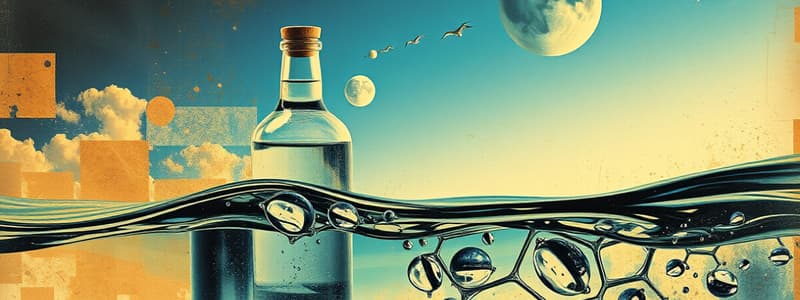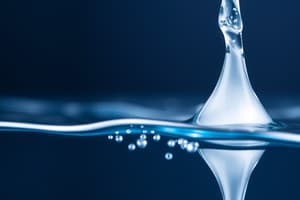Podcast
Questions and Answers
Why is water called the universal solvent?
Why is water called the universal solvent?
It is capable of dissolving more substances than any other liquid due to its chemical composition and physical attributes.
Like dissolves like. Therefore, oil dissolves in water.
Like dissolves like. Therefore, oil dissolves in water.
False (B)
Why don't oil and water mix?
Why don't oil and water mix?
- Oil is denser than water.
- Water is polar and oil is non-polar. (correct)
- Oil evaporates quickly.
- Water and oil have similar polarities.
What charges do water molecules have?
What charges do water molecules have?
What does pH indicate?
What does pH indicate?
What is a covalent bond?
What is a covalent bond?
Define solution.
Define solution.
What is a solute?
What is a solute?
What is a solvent?
What is a solvent?
What is a hydrogen bond?
What is a hydrogen bond?
What is cohesion?
What is cohesion?
What is adhesion?
What is adhesion?
What is an acid?
What is an acid?
What is a base?
What is a base?
Define capillary action.
Define capillary action.
What is a polar molecule?
What is a polar molecule?
What is a non-polar molecule?
What is a non-polar molecule?
What does the pH scale measure?
What does the pH scale measure?
What is low pH associated with?
What is low pH associated with?
What is high pH associated with?
What is high pH associated with?
Flashcards are hidden until you start studying
Study Notes
Water as a Universal Solvent
- Water can dissolve more substances than any other liquid due to its unique chemical composition and physical properties.
- The polar arrangement of oxygen (negative charge) and hydrogen (positive charge) in water allows it to attract various molecules.
Polarity and Dissolution
- Water is classified as a polar molecule, while oil is non-polar, resulting in water's inability to dissolve oil.
- Salt, being ionic and highly polar, dissolves well in water due to the principle "like dissolves like," where polar substances dissolve other polar substances.
Oil and Water Separation
- Oil and water do not mix because of their differing polarities; oil is less dense and floats on top of water.
- The strong attraction between water molecules (cohesion) inhibits their attraction to oil molecules.
Characteristics of Water Molecules
- Water molecules exhibit polarity, with the oxygen end slightly negative and the hydrogen end slightly positive.
Key Chemical Concepts
- pH indicates the hydrogen ion concentration in a solution, typically measured on a scale from 0 (acid) to 14 (basic).
- A covalent bond involves the sharing of electron pairs between atoms.
- A solution is a homogeneous mixture of two or more substances, with the solute being the substance dissolved in the solvent (the dissolving liquid).
Types of Bonds and Interactions
- Hydrogen bonds are weak attractions between a hydrogen atom and another atom, influencing various properties of water.
- Cohesion refers to the attraction between molecules of the same substance, while adhesion is the attraction between different substances.
Acids and Bases
- Acids increase hydrogen ion concentration in a solution, while bases decrease it.
- A low pH indicates an acidic solution, whereas a high pH indicates a basic solution.
Additional Properties
- Capillary action describes how liquid rises or moves in narrow spaces due to the attraction between the liquid's surface and that of a solid.
- Polar molecules have charged areas, while non-polar molecules share electrons equally, lacking charged ends.
Studying That Suits You
Use AI to generate personalized quizzes and flashcards to suit your learning preferences.




